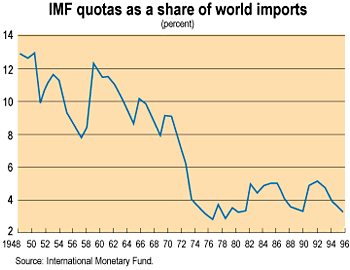Imf Quota Reform
quota reform wallpaperQuotas determine a members share in a general allocation of SDRs. A member can borrow up to 200 percent of its quota annually and 600 percent cumulatively.
 Finance Development December 1998 From Grandmotherliness To Governance The Evolution Of Imf Conditionality
Finance Development December 1998 From Grandmotherliness To Governance The Evolution Of Imf Conditionality
Acknowledging the underlying shift taking place in the world economy with emerging market economies playing an increasingly important role the IMF reform process aims to better align quota and voting shares in the Fund with member countries weight and role in the global economy.

Imf quota reform. Higher IMF quota simply means more voting. As a result of the 14 th quota reform a doubling of IMF quotas and a major shift in quota shares toward dynamic emerging market and developing countries has occurred. On December 15 2010 the Board of Governors of the International Monetary Fund IMF approved a package of far-reaching reforms of the Funds quotas and governance.
On March 28 2008 the Executive Board of the IMF endorsed a major package of reforms that will enhance the institutions governance. The quota and the governance reform ushered by IMF are truly historic. Quotas are the building blocks of the IMFs financial and governance structure.
The 2008 Quota and Voice Reforms of the International Monetary Fund IMF entered into force today following ratification of the Amendment on Voice and Participation to the Funds Articles by 117 member countries representing 85 percent of the Funds total voting power. As the IMF embarks on its quota review questions remain as to whether it will redistribute voting shares The IMF is developing its 15th General Review of Quotas after the US Congress failed to authorise the previous IMF quota and governance reform until 2015 after it was initially agreed in 2010 see Observer Winter 2016. IMF Reforms IMF Quota.
Two main issues addressed in a general quota review are the size of an overall quota increase and the distribution of the increase among the members. Any revision in IMF quota system shall be approved by at least 85 majority of total voting power ad a member consent is necessary to change its quota in IMF. As the IMF is set to publish its 15th General Review of Quotas by the October World Bank and IMF Annual Meetings the US has suggested that it will block reforms of quotas in favour of extending the portion of New Arrangements to Borrow NAB which are designed as a backstop to the Funds quota-based financing mechanism see Observer Spring 2019 see Update 79.
Any changes in quotas must be approved by an 85 majority of the total voting power and a members own quota cannot be changed without its consent. The IMFs Board of Governors conducts general quota reviews at regular intervals no more than five years. Quota Reform For a more representative modern IMF The reforms significantly increased the IMFs core resources enabling the institution to respond to crises more effectively and also improve the IMFs governance by better reflecting the increasing role of dynamic emerging market economies and developing countries in the global economy.
This quota reform was approved by the IMFs Board of Governors in 2010 but it finally came into effect as late as January 2016. Thus the 2015 change reflected economic data as they existed seven years earlier in 2008. To support Ukraine through the IMF maintain our countrys position of leadership at the institution and advance our strategic interests around the world.
However access may be higher in exceptional circumstances. Beyond the 15th Review we are committed to revisiting the adequacy of quotas and continuing the process of IMF governance reform under the 16th General Review of Quotas including a new quota. The IMFs Board of Governors conducts general quota reviews at regular intervals.
In 2010 the Board of Governors completed the 14th General Review of Quotas which involved a package of far-reaching reforms of the Funds quotas and governance. Quota reform and the gain for emerging market economies. However the reform is not representative of any major revamping as stipulated by the developing economies.
Any changes in quotas must be approved by an 85 percent majority of the total voting power and a members own quota cannot be changed without its consent. In these video clips government officials NGO representatives and IMF staff discuss the role of emerging market and low-income countries in the IMF. March 25 2020 The IMF is a quota-based institution.
IMF quota simply means more voting rights and borrowing permissions under IMF. The Board Reform Amendment was part of a broader package of quota and governance reforms of the Fund. The Senate proposal also includes critical IMF quota and governance reform legislation that will immediately strengthen the ability of the US.
An individual member countrys quota broadly reflects its relative position in the world economy. 1 The amendment strengthens the representation of dynamic economies in the IMF and enhances the voice and participation of low-income countries. The share of emerging market economies increased at the expense of mostly European countries and Saudi Arabia.
The 26 percentage points in voting rights gained by emerging economies is far from the 20 percentage points gain in the economic gains over the past decade ii. These reforms represent a major realignment in the ranking of quota shares that better reflects global realities and a strengthening in the Funds legitimacy and effectiveness. Taken together with earlier reforms agreed in 2008 the 2010 reform will produce a combined shift of 9 percent of quota shares to dynamic emerging market and developing countries.
Once approved by the Funds Board of Governors they are expected to cast their votes by April 28 the agreement will adjust quota shares to better reflect the relative weight of member countries in the world economy particularly that of dynamic emerging countries. This reform doubled the IMFs quota resources and brought in some changes in its voting and quota structures.